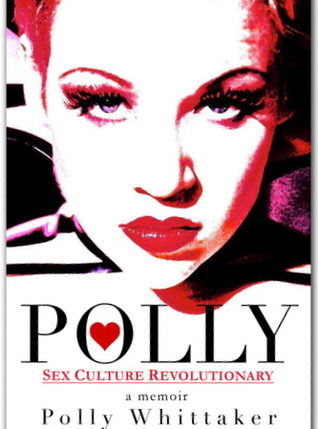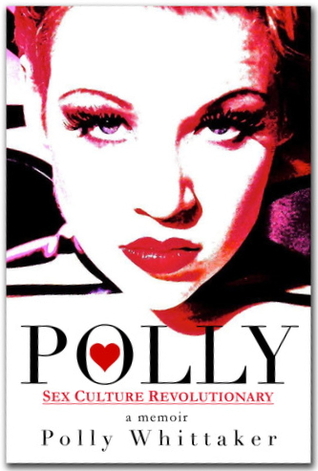
Book Review: Polly: Sex Culture Revolutionary
Following up on her interview with the author from earlier this year, Danielle Dorky reviews Polly Whittaker’s recently published memoir, Polly: Sex Culture Revolutionary.
Author: Polly Whitaker
Book Title: Polly: Sex Culture Revolutionary
Genre: Memoir, Sexuality, Culture
Length: 299 pages paperback
Publish date: 2014
Publisher: Moral Minority Press
Similar books/authors: The Ethical Slut by Dossie Easton, Annie Sprinkle: Post-Porn Modernist by Annie Sprinkle
Re-readability: [Rating:8/10]
Dorkproval rating: [Rating:7.5/10]
Favorite Quote: “Sex is where I hide my fucked-up-ness, and digging into that compost is where I find my truest art.”
It was her brazen claim of the label, “sex culture revolutionary” that initially prompted me to reach out and interview Polly Whittaker earlier this year. I like to consider myself fairly knowledgeable when it comes to contemporary sex culture, and yet I’d never heard of the London-born bombshell who’s been throwing raucous, kinky parties in San Francisco’s renowned Mission District for over ten years. I quickly remedied that, and in doing so learned that in addition to throwing all-inclusive artsy, kinky parties, Polly is an acclaimed latex fashion designer, publisher of a ground-breaking zine called SanFranSexy, and partner in a recently launched social network experiment geared towards alternative relationships and sexuality called Kotango. It wasn’t difficult to see how sexuality had framed much of Polly’s life and career thus far, and I looked forward to reading even more details in her newly published memoir, Polly: Sex Culture Revolutionary.
Ms. Whittaker went the increasingly popular route of opting to crowd fund and self-publish her book on her own terms, and the result is an authentic, crisply written, and smarmy account of her three “births,” beginning with the traditional separation from womb in the mid-seventies. Polly’s second birth followed a quarter-century later, shortly after her arrival in San Francisco from London; and her final birth occurred nearly a decade ago, after tattooing a rainbow arc of stars across her belly. Polly is told in a series of vignettes that volley between her recent past in San Francisco as a kinky party organizer and burgeoning sex culture symbol, and her adolescence in London, where she struggled to fit in and come to terms with a terminally ill parent. Though it came off a bit disjointed at first, the pieces slowly come together, and the the contrast of tales, such as her first trip to Burning Man, offer much-needed levity to the harsh reality of losing a loved one.
It would be foolish for conservative readers to attempt to place Polly into a sexuality-shaming box, especially since she’s spent a good portion of her lifetime defying and challenging such misconceptions. Such readers will be pleasantly surprised to find that the memoir offers broad wisdom about making life-changing decisions, following your passions, and learning to trust your instincts. Often we become so focused on a singular goal that we fail to recognize the small, but noteworthy accomplishments along the way. Polly will make readers take a step back to appreciate the mundane work that ultimately results in progress. Surely Whittaker had no idea when she was entering numbers into spreadsheets that she was helping to revolutionize the way Americans regard latex by introducing colors, textures, and light-heartedness into a fabric we’ve learned to associate with dominatrices, BDSM, and pain. Kinky Salon parties began impulsively, as a way to supplement the rent, and grew into a safe haven that allowed swingers, submissives, fetishists, and more to explore their boundaries and embrace their sexuality.
In fact, if I take any issue at all with Polly, it’s that her accomplishments aren’t touted nearly enough. SanFranSexy and Openly, the website she eventually merged with Kotango, aren’t mentioned at all, and many of her stories about Kinky Salon reflect the stress brought on by hosting recurring events in her home, including the toll it took on her long-term relationship. The memoir revolves largely around her partner Scott and their shared ambitions and, save a few choice chapters, there’s not much about her interaction with the community outside of her parties. I’ve no doubt that Polly is an important figure in the current San Francisco sex community, but I get the feeling her story is far from over, and at times, Polly: Sex Culture Revolutionary feels a bit premature.
Despite my misgivings, I have to admit that Polly’s motivation and commitment to living life on her own terms inspired me, and made me wonder about some of my own ideas that I’ve cast off as too ambitious, unrealistic, or just plain dumb. She is frank in her shortcomings and missteps, and in doing so makes us realize that sometimes failure can be a blessing in disguise because it makes us consider other, oftentimes better possibilities.
Whether or not Whittaker is hasty in titling herself a sex culture revolutionary is up for debate, but in my doubts I’m reminded that many of the figures we revere today began their activism just as incidentally, out of a sense of necessity, and without seeking titles, recognition, or fame. Polly: Sex Culture Revolutionary will challenge the way you look at sex, relationships, and make you reconsider the change you’re capable of inflicting on your own surroundings.
Categories: Reviews

